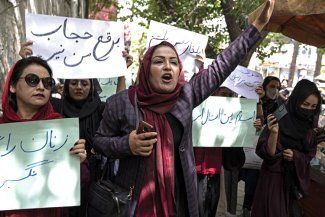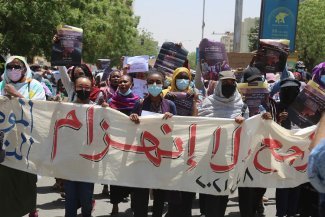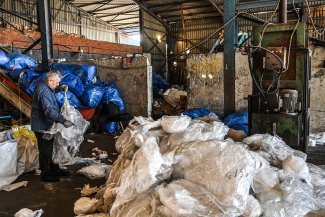Annalena Baerbock, Germany’s federal minister for foreign affairs, speaking at the presentation of the guidelines for her ‘feminist foreign policy’ on 1 March 2023 in Berlin.
A month after winning the October 2022 general election, Sweden’s new right-wing government, allied with the far-right, made a historic U-turn. Within hours of his appointment, the minister for foreign affairs, Tobias Billström, told Swedish news agency TT that the feminist foreign policy pursued by his predecessor, Margot Wallström, would be ditched.
‘Feminist foreign policy’, introduced in 2014 by the former Swedish foreign minister, is an evolving concept aimed at improving women’s rights around the world through diplomatic relations. It rests on three essential pillars, or the three Rs: rights, resources and representation. Its scope can range from funding development projects aimed at fostering gender equality to increasing women’s representation in the diplomatic sphere and giving them a stronger voice in negotiations and decision-making.
Following in Sweden’s footsteps, foreign ministries in other countries, such as Canada, France, Mexico, Spain, Luxembourg and Germany, have also adopted this type of approach, incorporating it, each in their own way, into their international policies.
This is what inspired Annalena Baerbock, the first woman to be appointed federal minister for foreign affairs in Germany, to want to make feminist foreign policy central to her mandate, which began in December 2021. In March 2023, her ministry set out a roadmap that undertook to appoint an ambassador dedicated to feminist foreign policy and to increase the share of “gender-sensitive projects” it funds from 64 to 85 per cent by 2025. It also pledged to allocate a further eight per cent of the ministry’s budget to projects focussed on fostering gender equality.
One example is the German state’s funding, via local associations supported by UNICEF, of medical and psychological support for victims of sexual violence in Ethiopia and Somalia.
Meanwhile, France’s ‘feminist diplomacy’ has chosen to focus on promoting sexual and reproductive rights and supporting gender equality in developing countries. “France has a good track record for taking progressive positions in multilateral bodies, such as its defence of the right to abortion at the UN Security Council,” explains Alice Apostoly, co-founder of IGG (Gender in Geopolitics Institute), a think tank and research centre examining international relations from a gender perspective.
Involving women in negotiations and decision-making
Feminist diplomacy also refers to women’s capacity to be better placed to support and apply lasting peaceful values, overcoming certain divisions. Muriel Domenach, France’s ambassador to NATO since 2019, considers it vital to countering existing diplomacy, which is overwhelmingly male and “equates power with brutality”.
In an article published by the Gender in Geopolitics Institute, Cassandre Impagliazzo, a consultant on gender issues and a former employee of the French embassy in Vietnam, argues that “while virility tends to foster violence, the presence of women and feminist motivations within international diplomacy is more likely to highlight the problems faced by minorities. [...] Feminist foreign policy could not only work in favour of gender equality but also, and above all, in favour of respect for human rights in general”. In other words, rethinking policies by including a gender perspective could result in a more universal approach to addressing problems.
Academic research over recent years has been showing the significant impact of women’s participation in peace-building, as seen in Yemen, where women shared their experiences of the conflict.
Or Colombia, where, to reach the peace deal signed with the FARC in 2016, women were actively encouraged to take part for the first time, through their testimonies and their presence at the negotiating table, leading to a whole chapter of the peace agreement on the “gender-specific” dimensions of the conflict and its peaceful resolution. The Colombian experience is considered the first of its kind on this scale. Meanwhile, the South Asia Association for Regional Cooperation (SAARC) has long been developing diplomatic initiatives to support women’s rights and gender equality in countries affected by armed conflict, such as Sri Lanka, Afghanistan and Myanmar.
The “role of women in the prevention and resolution of conflicts and peace-building” is the subject of Resolution 1325 on “Women, Peace and Security”, unanimously adopted by the UN Security Council over 20 years ago. As a result, a politico-military organisation such as NATO has a special representative in charge of this mission, Irene Fellin. During a visit to Kyiv in May 2023, in the context of the war in Ukraine, she reiterated “the importance of women’s equal participation in decision-making throughout the war and after Ukraine’s victory”.
Women’s participation and consideration for gender-related issues are also increasingly seen as having a positive impact on the formulation of economic and development policies. Empowering women and girls to help bring about a more just and equal society is one of the aims of the UN’s 2030 Agenda. With this in mind, SDG 5.5 specifically calls for “women’s full and effective participation and equal opportunities for leadership at all levels of decision-making”. Since the gender impacts are now recognised, place also needs to be made for a feminist policy approach in the negotiation of international trade agreements and economic treaties.
Women’s representation still low
According to Ann Towns, a Swedish lecturer and researcher specialising in the links between gender and diplomacy, women’s presence in diplomacy continues to be a crucial issue. “This is one of the branches that was late in accepting women. When democratic states began opening up their administrations to women – many after World War II – there was often an exception for the military and diplomatic corps,” she recalls.
Female representation in French embassies is improving, according to the French non-profit organisation Focus 2030, but “very slowly”. Today, only 39 of them are headed by a woman. The year 2021 saw the highest rate of appointment of female ambassadors: 34 per cent. “Generally speaking, women ambassadors are not appointed to embassies of major geopolitical importance. France’s exemplarity is not necessarily respected and is very timid,” Apostoly continues.
“Research has shown that while the visibility and presence of women in high-level diplomacy and defence has increased over the last 20 years, the vast majority of decision-making positions are still held by men, particularly at the top of the pyramid,” explains Marie-Cécile Naves, director of research at France’s Institute for International and Strategic Relations (IRIS).
As for UN bodies, Apostoly observes: “It’s mainly UN Women that deals with such matters, when they should be dealt with as cross-cutting issues.” There is also “a refusal to see women at negotiating tables”, because, in her view, “the United Nations headquarters remains a male establishment, like so many others. These values are defended by powerful men who benefit from something of a status quo.”
In an opinion piece published online by Le Monde in 2020, Apostoly and her IGG colleague Déborah Rouach spoke of the “grip of patriarchal systems” on international decision-making and “the return to conservative values”, particularly in discussions on sexual and reproductive health and sexual violence during conflicts.
An approach that varies from one country to the next
Although presented through the prism of good intentions, ‘feminist diplomacy’ invariably comes up against political, economic and cultural obstacles. The concept is still difficult to define formally. “Feminism can be defined in many different ways, and so too therefore can feminist diplomacy. It remains to be seen exactly what each country does with it, and the observations are only just beginning,” says Towns.
“Feminist movements are far from politically homogenous. Not all activists and intellectuals agree on what a structural transformation of this kind might entail,” adds Saskia Brechenmacher, a researcher in international politics at Cambridge University. Do the differences in viewpoints and lack of cohesion make it more difficult to apply feminist diplomacy? “Not necessarily, but it does mean that there are bound to be mixed responses and divergent views on these policies. Some people will also feel that governments never do enough,” says the German researcher.
Just as in other spheres, this voluntarist diplomacy has to contend with the strategic interests of states.
“France is known for its feminist diplomacy, but also for its arms trade. This is a major source of contradiction. Our trade policy does not have a gender perspective. The weapons sold are sometimes used, for example, in Yemen, against the people, and therefore against women, children and girls,” notes Apostoly.
Another example of strategic contradiction was Germany’s reluctance to support calls for a UN resolution for an immediate ceasefire in Gaza, because of its policy of total support for Israel. This stirred anger among feminists towards Annalena Baerbock, who was publicly accused of not taking action to end the suffering of the women of Gaza and not firmly advocating a pacifist route.
“Germany’s voting behaviour at the United Nations General Assembly caused disbelief and indignation among those in the Global South who had onceenthusiastically followed the development of the German government’s feminist foreign policy and its guidelines,” said Lydia Both, head of the Friedrich-Ebert-Stiftung’s regional project on political feminism and gender, in an opinion piece published by IPS.
This is a reminder that ‘feminist diplomacy’ is not always easy to implement. And, as Naves argues, if we are not careful, it can also lead to potentially counter-productive, distorted views: “Essentialist stereotypes may persist, according to which women are more pacifist and men more violent, and women are the main victims of violence in the world. Yet, many men are exploited economically and are victims of violence – including gender-based violence – such as in certain war situations. This is why it is important to give equal consideration to male and female issues in diplomacy, which could be described as ‘gender-conscious foreign policy’, and involve men.”
Meanwhile, African feminists, for example, are wary of a concept that could encourage what might be perceived as neo-colonialist development policies. Ugandan writer Rosebell Kagumire, a contributor to the African Feminism platform, argues that: “Western feminist foreign policy should not be packaged as something that is here to save us. We can see feminist foreign policy as a framework that we can use in certain instances, but being aware of the silences it maintains, and what they leave out that is uncomfortable to them, […] especially that foreign policy that is silent on a pertinent issue like racial justice.”













